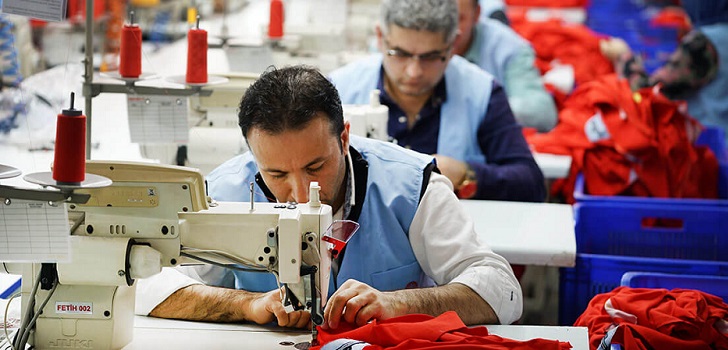Coronavirus: Turkey rises prices and threatens the profit margins of fashion in 2020
The movement of orders to countries of the Euro-Mediterranean pool is triggering a rise in prices from the part of suppliers.

Not only does ecommerce threaten the margins of the fashion industry. A new supervening element pushes down the margins of the sector. The sudden transfer of productions to Turkey is leading to a price increase and the giants are already preparing for a cut in their margins in 2020. “There is a collapse of capacity: those who were already there have secured space, but those who have arrived late have no other choice but to pay more,” says an executive of the sector.
The situation is repeated in Morocco, Tunisia, Romania, and Portugal, although Turkey is the market for which fashion groups are venturing more into to deal with the breakdown of the supply chain by the paralysis of factories in China and the affectation of ports and airports.
There are several executives in the sector who already warn of a price increase, mainly in Turkey. The impact of this movement of Turkish suppliers will be noticed, especially in the autumn-winter 2020 season, although the profit margins for the entire year are already compromised.
Turkey is the sixth-largest textile exporter in the world
In addition to the proximity to the European consumer market, one of Turkey’s advantages as a supply hub for the fashion sector is the development of the entire value chain in the country, from the production of raw materials (Turkey is the seventh world cotton producer and one of the largest consumers of this raw material) until manufacturing. This structure gives the country speed in the response.
Turkey is currently the sixth-largest textile exporter in the world, with 3.1% of the total in 2018. The ranking is led by China, which in 2018 recorded 37.6% of total textile exports and 31.3% of clothing exports, followed at a great distance by the European Union, Bangladesh, Vietnam, and India.
Over the last few years, an increasing amount of companies are betting on Turkey as a supply hub, a movement that is now accelerating. Inditex is one of the groups that is betting more on Turkey as a backup in the middle of the Chinese crisis.
C&A, H&M or Inditex have a large part of their sourcing in the country
The Spanish giant already had its main supply hub in Turkey nearby. At the end of the last financial year, Zara’s parent company had 198 suppliers in the country, which added a workforce of 251,277 people. C&A, H&M or Gap are other international companies in the sector that are provisioned in the country. The Dutch company works with 132 factories in Turkey, while Gap has eight suppliers in the country and H&M, three.
“The truth is that China was already ceasing to be competitive in prices in recent years and we were already looking for other places to stock up: the current situation does nothing but fill us with reasons to return to proximity,” explains an industry executive. He adds that “the evolution of the currency has made Turkey a hypercompetitive market.”
Turkey has gone through one of its worst economic moments following the lira fiasco in 2018 after the United States announced that it doubled import tariffs on steel and aluminum from that country.
In August 2018, the Turkish lira lost 25% of its value, accumulating a 40% devaluation since the beginning of the year. After this situation, in Central Bank of Turkey was injected 6 billion dollars into the financial system and decided to reduce the limits of foreign exchange reserves allowed to Turkish banks in order to remove the lira from the market, give liquidity to the system and stabilize the value of the lira. At the end of this edition, the lira was trading at $ 0.16.
In August 2018, the Turkish lira lost 25% of its value
Textiles, which are very sensitive to production costs, made the point of this devaluation to accelerate purchases in the country. In 2018, the European Union increased its purchases by 2% to the Turkish textile industry, which is established as the third-largest hub in the European zone, according to data from Icex Spain Export and Investment.
In 2019, Turkish fashion exports recorded an increase of only 0.4%, to 17.7 billion dollars. Before the coronavirus crisis outbreak, the Istanbul Clothing Exporters Association predicted that the country’s fashion exports will exceed $19 billion in 2020.
Turkey’s textile industry is made up of 89,085 companies specializing in both textile, clothing, and leather and footwear, according to the country’s statistical institute. The sector also employs thirteen million people. Turkey’s interprofessional minimum wage (SMIC) has increased by 55.3% between 2016 and 2019, from 1,647 lire to 2,558.4 lire per month.
The global economic slowdown has also affected Turkey. In 2018, the country’s Gross Domestic Product (GDP) grew by 2.8%. In 2019, the Turkish economy reduced its pace, registering an evolution of only 0.2%, according to data from the International Monetary Fund (IMF).


info@themds.com
Validation policy for comments:
MDS does not perform prior verification for the publication of comments. However, to prevent anonymous comments from affecting the rights of third parties without the ability to reply, all comments require a valid email address, which won’t be visible or shared.
Enter your name and email address to be able to comment on this news: once you click on the link you will find within your verification email, your comment will be published.